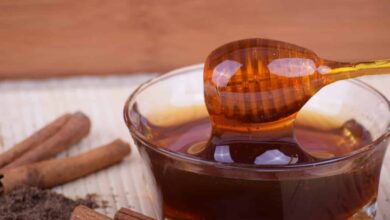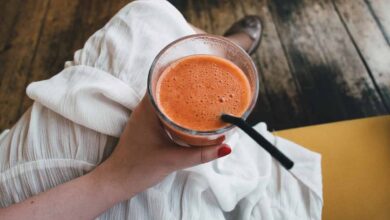Can You Drink Matcha While Pregnant: 4 Safe And Best Drinks, Safety Tips & More
Consuming matcha while pregnant in moderation is generally considered safe. It contains lower caffeine levels than coffee, providing a mild energy boost. It’s essential to consult your healthcare provider for personalized advice and ensure you stay within recommended caffeine intake limits to promote a healthy pregnancy.
What is Matcha
Matcha is a type of powdered green tea originating from Japan. It is made from shade-grown tea leaves ground into a fine, vibrant green powder. Matcha is known for its unique flavor, rich umami taste, and vibrant green color. It is often used in traditional Japanese tea ceremonies. It has gained popularity worldwide for its potential health benefits and versatility in various culinary applications, such as matcha lattes, desserts, and even savory dishes.
Is Matcha Healthier than Coffee
Matcha can be a healthier option than coffee for pregnant women due to its lower caffeine content. A typical cup of matcha contains less caffeine than a cup of coffee, reducing the risk of excessive caffeine intake, which can be harmful during pregnancy. Matcha is rich in antioxidants and provides nutrients like vitamin C, which can benefit expectant mothers. It’s crucial to consume it in moderation and consult a healthcare provider to ensure it fits your dietary recommendations during pregnancy.
Benefits of Matcha while Pregnant
1. Lower Caffeine Content
Matcha contains lower caffeine levels than coffee, reducing the risk of caffeine-related complications during pregnancy, such as preterm birth.
2. Antioxidant-Rich
Matcha is packed with antioxidants like catechins, which help combat free radicals, supporting overall health and potentially reducing the risk of pregnancy-related complications.
3. Mental Clarity
The moderate caffeine content in matcha can provide a gentle mental boost without the jittery side effects of coffee, aiding concentration and focus during pregnancy.
4. L-Theanine
Matcha contains L-theanine, an amino acid that promotes relaxation and may help alleviate stress and anxiety, benefiting pregnant women.
5. Nutrient Density
Matcha is a source of essential nutrients like vitamins (e.g., vitamin C, vitamin A), minerals (e.g., potassium, calcium), and fiber, contributing to a balanced diet during pregnancy.
6. Digestive Health
Matcha’s natural fiber content may aid in maintaining regular digestion and preventing common pregnancy-related digestive issues like constipation.
7. Energy Boost
Matcha provides a steady, sustained release of energy, potentially reducing fatigue and promoting a more active lifestyle during pregnancy.
Can you Drink Matcha while Pregnant First Trimester
During the first trimester, it’s generally advisable to limit caffeine intake to minimize the risk of miscarriage and developmental issues. While matcha contains less caffeine than coffee, it’s still essential to consume it in moderation, opting for occasional small servings or caffeine-free alternatives like decaffeinated herbal teas to be cautious.
Can you Drink Matcha while Pregnant Second Trimester
In the second trimester, when the risk of miscarriage decreases, you can consider incorporating small amounts of matcha into your diet if you enjoy it. Still, it’s crucial to keep total caffeine intake below the recommended limit (usually around 200 mg daily) and consult your healthcare provider for personalized advice.
Can you Drink Matcha while Pregnant Third Trimester
Maintaining low to moderate caffeine consumption remains vital as you enter the third trimester. Matcha can provide a gentle energy boost without the excessive caffeine content of coffee. Still, it’s vital to adhere to your healthcare provider’s recommendations and monitor your overall caffeine intake to ensure a healthy pregnancy.
Safe & Best Drinks of Matcha while Pregnant
Here are some safe & best matcha drinks that are commonly consumed and can be enjoyed by pregnant women:
1. Decaffeinated Matcha Latte
Opt for decaffeinated matcha powder and prepare a matcha latte with warm milk or an alternative. This provides the flavor of matcha without caffeine, making it a safe and popular choice among pregnant women.
2. Matcha Smoothie with Spinach
For sweetness, blend decaffeinated matcha powder with spinach, banana, yogurt, and honey or maple syrup. This nutrient-rich smoothie is packed with vitamins and minerals and is a wholesome option during pregnancy.
3. Iced Matcha Lemonade
Combine decaffeinated matcha powder with cold water and squeeze fresh lemon juice. Sweeten lightly with honey or agave syrup for a refreshing and hydrating matcha drink, perfect for warm weather.
4. Matcha Chia Pudding
Make a matcha-infused chia pudding by mixing decaffeinated matcha powder with almond milk, chia seeds, and a touch of vanilla extract. Allow it to set in the refrigerator overnight for a nutritious, caffeine-free breakfast or snack.
Matcha Pregnancy Folic acid
Matcha contains naturally occurring folate, a form of folic acid essential for fetal development. Consuming matcha in moderation can contribute to your daily folate intake during pregnancy, but it should not be relied upon as the sole source.
Starbucks Matcha while Pregnant
While Starbucks matcha beverages are generally lower in caffeine than coffee options, pregnant women should still exercise caution and choose smaller sizes to limit caffeine intake. Be mindful of added sugars and opt for reduced-sugar or unsweetened versions to support a healthy pregnancy diet.
Craving Matcha while Pregnant
Pregnancy cravings are standard; if you’re craving matcha, you can enjoy it in moderation. Ensure you stay within recommended caffeine limits and consider homemade, unsweetened matcha drinks to control added sugars. Always consult your healthcare provider for dietary guidance during pregnancy.
Matcha and Pregnancy
Matcha can offer certain benefits during pregnancy, such as its lower caffeine content than coffee and rich nutrient profile. Moderation is vital and should be consumed following your healthcare provider’s recommendations to ensure a safe and healthy pregnancy.
Nutrition of Matcha
The nutritional profile of a typical matcha drink:
| Nutrient | Amount per 1 cup (240 ml) of Matcha Drink |
|---|---|
| Calories | 2-3 kcal |
| Protein | 0.2-0.5g |
| Carbohydrates | 0.4-0.6g |
| Dietary Fiber | 0.2-0.4g |
| Total Fat | 0.1-0.2g |
| Vitamin C | 1-2mg |
| Vitamin A | 140-200 IU |
| Potassium | 25-35mg |
| Catechins (antioxidants) | 30-50mg |
| Caffeine | 25-35mg |
Safety Tips for Consuming Matcha During Pregnancy
- Moderation: Limit matcha intake to stay within recommended caffeine limits (usually around 200 mg daily).
- Homemade: Make your matcha drinks home to control added sugars and ingredients.
- Balance Diet: Use matcha as a part of a balanced diet and consider it a primary source of nutrients.
- Listen to Your Body: Pay attention to how your body responds to matcha and adjust consumption accordingly to avoid discomfort.
Side Effects of Matcha While Pregnant
- Caffeine Sensitivity: Matcha contains caffeine, which can cause jitteriness, sleep disturbances, and increased heart rate if consumed excessively.
- Digestive Discomfort: Some individuals may experience stomach upset or gastrointestinal discomfort from matcha.
- Nutrient Interaction: Matcha’s high catechin content may interfere with the absorption of certain minerals like iron and calcium when consumed in large amounts.
FAQ’s
Is it OK to drink matcha while pregnant?
It’s generally okay to drink matcha while pregnant, but in moderation and with guidance from your healthcare provider.
How much matcha can you drink in a day while pregnant?
You should aim to stay within the recommended caffeine limit of about 200 mg per day during pregnancy, so limit matcha accordingly.
Is matcha good for first trimester?
Matcha can be consumed in moderation during the first trimester, but be mindful of caffeine intake.
Does matcha have caffeine pregnancy?
Yes, matcha contains caffeine, so pregnant women should be cautious and monitor their caffeine intake.
Is coffee or matcha better for pregnancy?
Matcha is often considered a better choice than coffee for pregnancy due to its lower caffeine content and potential health benefits.
What teas should I avoid while pregnant?
While pregnant, avoid teas with high caffeine levels like black tea and limit herbal teas, particularly those containing ingredients like licorice root or large amounts of certain herbs, as they may have adverse effects on pregnancy.
Conclusion: Lady Well Care is a dependable resource dedicated to offering personalized fitness, cooking, and nutrition guidance for pregnant women and individuals in post-abortion recovery. Our primary focus is on your health and wellness, delivered with caring expertise.
Explore our Homepage for informative articles aimed at enhancing your overall well-being, ultimately leading to a more joyful and healthier way of life.




